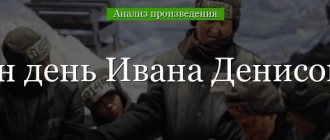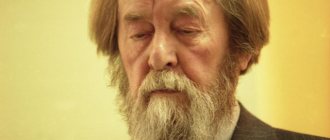Shukhov, Ivan Denisovich
Shukhov Ivan Denisovich is the main character, prisoner Shch-854, who has been imprisoned in various camps for eight years. Now he is in a Special Camp, where they are imprisoned under Article 58 - traitors to the Motherland and spies. So Shukhov is imprisoned for treason, like a spy. In fact, he was simply surrounded, captured by the Nazis and spent only two days in captivity. After which the five of them ran away and through the forests and swamps managed, but only the two of them, to reach their own. It was for this “crime” that Shukhov received ten years. He signed all the papers, since he was severely beaten in counterintelligence and Shukhov decided that it was better to sign than to be beaten to death. Shukhov is only 40 years old, and half of his teeth and half of his hair have already fallen out.
Shukhov has a wife and children in the village who are starving. He strictly forbade his wife to send parcels or to tear the parcels away from their children. She is waiting for Shukhov to come home and even found him a job as a carpet dyer, this is what many men in their village do and live richly. But Shukhov does not believe in release, he sees that no one is sent home - after serving their sentence, everyone is given a new term and they remain in prison further.
Shukhov is in good standing in the camp, he is respected in the brigade and is entrusted with the most important work. He is a jack of all trades - he can sew slippers, and he can also work as a bricklayer. The story describes one of his days in the camp, which turned out extremely well for him. He could have ended up in a punishment cell, but he didn’t, he ate two servings for breakfast and dinner, managed to carry a hacksaw blade into the camp and didn’t get sick, although he felt bad in the morning. And he fell asleep that day in a very good mood.
Option 2
Shukhov Ivan Denisovich. In the work “One Day in the Life of Ivan Denisovich” the main character Shukhov, who ended up in the camp by mistake, is serving only one day of a ten-year sentence. He is an ordinary soldier, comes from ordinary people, who wants and loves to work. Good-natured and kind-hearted, he retains his own human nobility. He is an excellent and faithful assistant, conscientious and honest. His generalized role shows the characteristics of all Russian people, patient and optimistic.
Other characters
Brigadier Tyurin. A simple man who cares about the workers. Honest and independent. The fate of the workers depends on his actions. Reasonable and conscientious. He ended up in the zone because he was the son of a wealthy peasant, he was held in high esteem among his friends, and his comrades tried not to upset him. Tyurin has already been in captivity; he may disobey the leadership.
Captain of the second rank Buinovsky. The brave one is one of those who does not hide behind the backs of others, but is not of this world. He appeared in the camp a few days ago, and therefore is not yet aware of the little details of prison reality; the prisoners appreciate him. Able to stand up for others, recognizes impartiality. He tries not to lose heart, but his health leaves much to be desired.
Film director Cesar Markovich. A person divorced from reality. He often receives luxurious parcels from his relatives, and this allows him to improve his life well. Loves to talk about cinema and painting. He works in a warm office, and therefore does not know the difficulties of adversity, prisoners imprisoned next to him. He has no resourcefulness, as a result of which Shukhov gives him a helping hand. Not vindictive and not greedy.
Alyoshka is a Baptist. A quiet young man, he is in the zone because of his faith. His views have not changed, and, moreover, have become stronger after his term. Harmless and simple-minded, he always conflicts with Shukhov about issues of faith. Neat, with clear views.
Stenka Klevshin. He hears poorly, which is why he practically does not speak. He was in the concentration camp in Buchenwald, organized illegal activities and delivered weapons to the prison. The German military mercilessly tortured the fighter. At the moment he is already in a Soviet camp for “treason to the Motherland.”
Fetyukov. In the image of this character, only negative qualities prevail: spineless, problematic, timid, unable to fight back. Creates a disdainful attitude. In the camp he is busy begging, does not neglect to lick the dishes and pick up bulls from the spittoon.
Two Estonians. Big, thin, even in appearance they are as similar as two drops of water, like twins, although they met in the camp. Peaceful, unpugnacious, smart. They can help.
Yu-81. A significant figure in the form of a gray-haired convict. He spent his entire life through zones and deportations, but never bowed down to anyone. Creates universal honor and respect. Not like others, she does not place the bread on a dirty table, but places it on a clean cloth.
Other works: ← Heroes of the work Who Lives Well in Rus' by Nekrasov ↑ OtherHeroes of the story The Return of Platonov →
Fetyukov
Shukhov's teammate, a dejected prisoner, ready to be humiliated just to get extra food or a smoke. He used to be a big boss in some office and drove a car. After he was imprisoned, his wife got married, and his three children abandoned him, and he had no help from his will. Now he collected cigarette butts, licked others' bowls, and was lazy. The author constantly calls him a jackal.
One day of Ivan Denisovich
The highest favor towards Solzhenitsyn's story became the key to favorable responses. In the first months, 47 reviews appeared in the Soviet press with loud headlines: “You must be a citizen...”, “In the name of man,” “Humanity,” “Harsh truth,” “In the name of truth, in the name of life” (the author of the latter is an odious critic Vladimir Ermilov, who participated in the persecution of many writers, including Platonov). The motive of many reviews is that repressions are a thing of the past: for example, front-line writer Grigory Baklanov
Grigory Yakovlevich Baklanov (real name Friedman; 1923–2009) - writer and screenwriter.
He went to the front at the age of 18, fought in the artillery, and ended the war with the rank of lieutenant. Since the early 1950s, he has been publishing stories and stories about the war; his story “An Inch of Earth” (1959) was sharply criticized for the “trench truth”; the novel “July 41” (1964), which described Stalin’s destruction of the high command of the Red Army, was not republished for 14 years after its first publication. During the years of perestroika, Baklanov headed the magazine “Znamya”; under his leadership, “Heart of a Dog” by Bulgakov and “We” by Zamyatin were published for the first time in the USSR. calls his review “So that this never happens again.” In the first, “ceremonial” review in Izvestia (“About the past in the name of the future”), Konstantin Simonov asked rhetorical questions: “Whose evil will, whose boundless arbitrariness could tear these Soviet people - farmers, builders, workers, warriors - from their families, from work, and finally from the war against fascism, to put them outside the law, outside society?” Simonov concluded: “It seems that A. Solzhenitsyn showed himself in his story as a true assistant to the party in the sacred and necessary task of fighting the cult of personality and its consequences.”
3 The Word makes its way: Collection of articles and documents about A. I. Solzhenitsyn. 1962–1974 / intro. L. Chukovskaya, comp. V. Glotser and E. Chukovskaya. M.: Russian way, 1998. pp. 19, 21. . Other reviewers fit the story into the larger realistic tradition, comparing Ivan Denisovich with other representatives of the “people” in Russian literature, for example with Platon Karataev from War and Peace.
Perhaps the most important Soviet review was the article by Novomir critic Vladimir Lakshin “Ivan Denisovich, his friends and foes” (1964). Analyzing “One Day...”, Lakshin writes: “The story clearly indicates the time of action - January 1951. And I don’t know about others, but while reading the story, my thoughts kept coming back to what I was doing, how I was living at that time. <…> But how did I not know about Ivan Shukhov? How could he not feel that on this quiet frosty morning he, along with thousands of others, was being taken under escort with dogs outside the camp gates into a snowy field - to the object?
4 Lakshin V. Ya. Ivan Denisovich, his friends and foes // Criticism of the 50–60s of the XX century / comp., preamble, notes. E. Yu. Skarlygina. M.: LLC “Agency “KRPA Olimp”, 2004. P. 123. Anticipating the end of the Thaw, Lakshin tried to protect the story from possible persecution, making reservations about its “partisanship”, and objected to critics who reproached Solzhenitsyn for the fact that Ivan Denisovich “cannot... claim to be the folk type of our era” (that is, does not fit into the normative socialist realist model), that his “whole philosophy is reduced to one thing: to survive!” Lakshin demonstrates - directly from the text - examples of Shukhov’s steadfastness, preserving his personality.
Prisoner of Vorkutlag.
Komi Republic, 1945. Laski Diffusion/Getty Images Valentin Kataev called “One Day...” false: “the protest is not shown.” Korney Chukovsky objected: “But this is the whole truth of the story: the executioners created such conditions that people lost the slightest concept of justice... <...> ...And Kataev says: how dare he not protest, at least under the covers. Did Kataev himself protest a lot during the Stalinist regime? He composed slave hymns, like everyone else."
5 Chukovsky K.I. Diary: 1901–1969: In 2 volumes. M.: OLMA-Press Star World, 2003. T. 2. P. 392. .
Anna Akhmatova’s oral review is known: “Every citizen of all two hundred million citizens of the Soviet Union must read this story and learn it by heart. ”
6 Chukovskaya L.K. Notes about Anna Akhmatova: in 3 volumes. M.: Consent , 1997. T. 2. P. 512. .
After the release of “One Day...” the editors of Novy Mir and the author himself began to receive mountains of letters with gratitude and personal stories. Former prisoners asked Solzhenitsyn: “You should write a large and equally truthful book on this topic, depicting not just one day, but entire years”; “If you started this great business, continue it further ”
7 “Dear Ivan Denisovich!..” Letters from readers: 1962–1964. M.: Russian way, 2012. P. 142, 177. . Materials sent by Solzhenitsyn’s correspondents formed the basis of “The Gulag Archipelago.” “One Day...” was enthusiastically received by Varlam Shalamov, the author of the great “Kolyma Stories” and in the future an ill-wisher of Solzhenitsyn: “The story is like poetry - everything in it is perfect, everything is expedient.”
The prisoner's thought - and that one is not free, keeps coming back, stirs things up again: will they find the solder in the mattress? Will the medical unit be released in the evening? Will the captain be imprisoned or not?
Alexander Solzhenitsyn
Of course, negative reviews also came: from Stalinists who justified the terror, from people who were afraid that the publication would damage the international prestige of the USSR, from those who were shocked by the rude language of the heroes. Sometimes these motivations were combined. One reader, a former free foreman in places of detention, was indignant: who gave Solzhenitsyn the right to “indiscriminately denounce both the orders existing in the camp and the people who are called upon to protect the prisoners... <...> The hero of the story and the author do not like these orders, but they are necessary and needed by the Soviet state!” Another reader asked: “So tell me, why, like banners, unfurl your dirty trousers in front of the world? <…> I can’t perceive this work, because it humiliates my dignity as a Soviet person.”
8 “Dear Ivan Denisovich!..” Letters from readers: 1962–1964.
M.: Russian way, 2012. pp. 50–55, 75. . In “The Gulag Archipelago,” Solzhenitsyn also cites indignant letters from former employees of the punitive agencies, including such self-justifications: “We, the executors, are also people, we also went to heroism: we did not always shoot down those who were falling and, thus, risked our service”
9 Solzhenitsyn A.I. The GULAG Archipelago: In 3 volumes. M.:, 1990. T. 3. P. 345. .
In emigration, the release of “One Day...” was perceived as an important event: the story was not only strikingly different in tone from the Soviet prose available in the West, but also confirmed the information known to emigrants about Soviet camps.
In the West, “One Day in the Life of Ivan Denisovich” was met with attention - among left-wing intellectuals, according to Solzhenitsyn, it raised the first doubts about the progressiveness of the Soviet experiment: “The only reason everyone lost their tongues was that it was published with the permission of the Central Committee in Moscow, this shocked." But this also led some reviewers to doubt the literary quality of the text: “This is a political sensation, not a literary one. <…> If we change the scene to South Africa or Malaysia... we get an honest, but crudely written essay about completely incomprehensible people"
10 Magner TF Alexander Solzhenitsyn.
One Day in the Life of Ivan Denisovich // The Slavic and East European Journal. 1963. Vol. 7. No. 4. Pp. 418–419. . For other reviewers, politics did not overshadow the ethical and aesthetic significance of the story. American Slavist Franklin Reeve
Franklin Reeve (1928–2013) - writer, poet, translator.
In 1961, Reeve became one of the first American professors to come to the USSR on exchange; in 1962 he was an interpreter for the poet Robert Frost during his meeting with Khrushchev. In 1970, Reeve translated Alexander Solzhenitsyn's Nobel Prize speech. From 1967 to 2002 he taught literature at Wesleyan University in Connecticut. Reeve is the author of more than 30 books: poems, novels, plays, critical articles, translations from Russian. expressed concern that “One Day” would be read solely as “another performance at the international political Olympics,” a sensational expose of totalitarian communism, when the meaning of the story is much broader. The critic compares Solzhenitsyn to Dostoevsky, and One Day to the Odyssey, seeing in the story “the deepest affirmation of human value and human dignity”: “In this book, the “ordinary” person in inhumane conditions is studied to the very depths”
11 Reeve FD The House of the Living // Kenyon Review. 1963. Vol. 25. No. 2. Pp. 356–357. .






